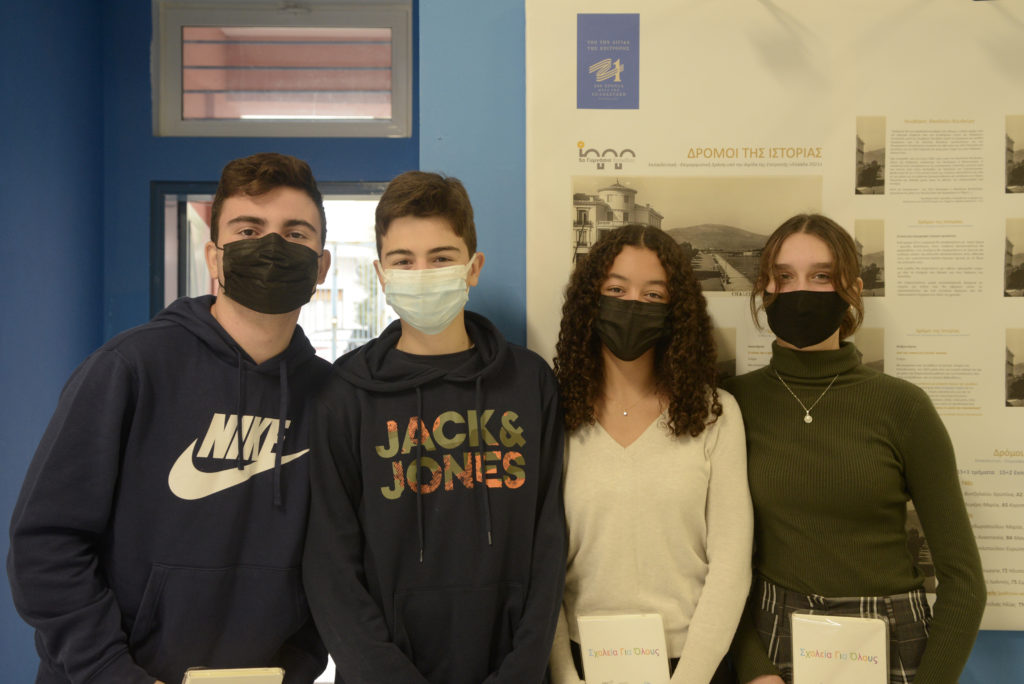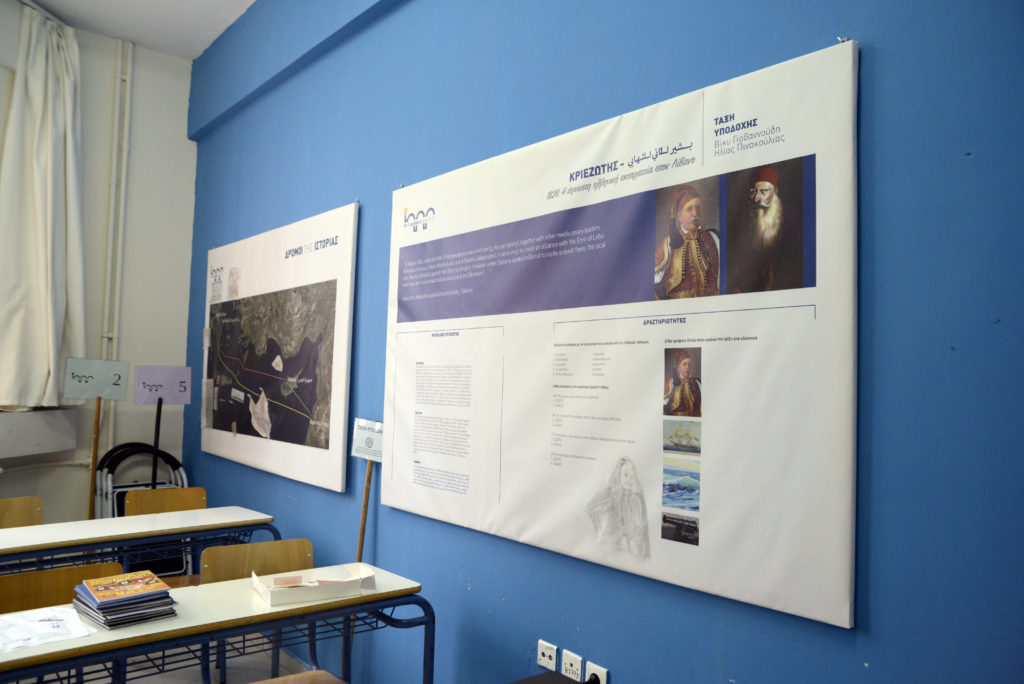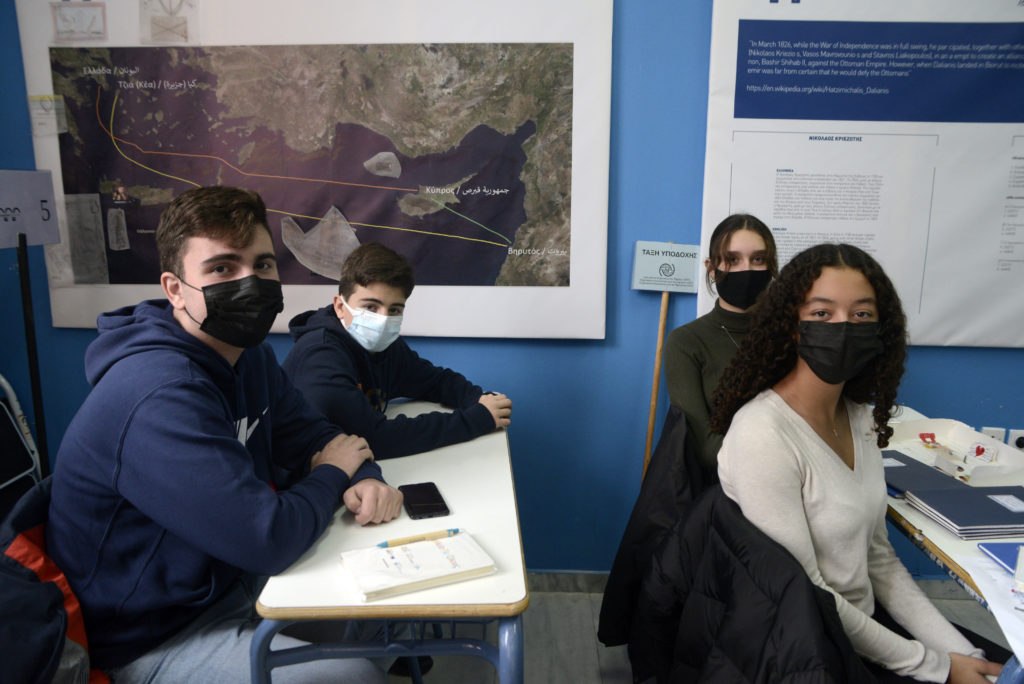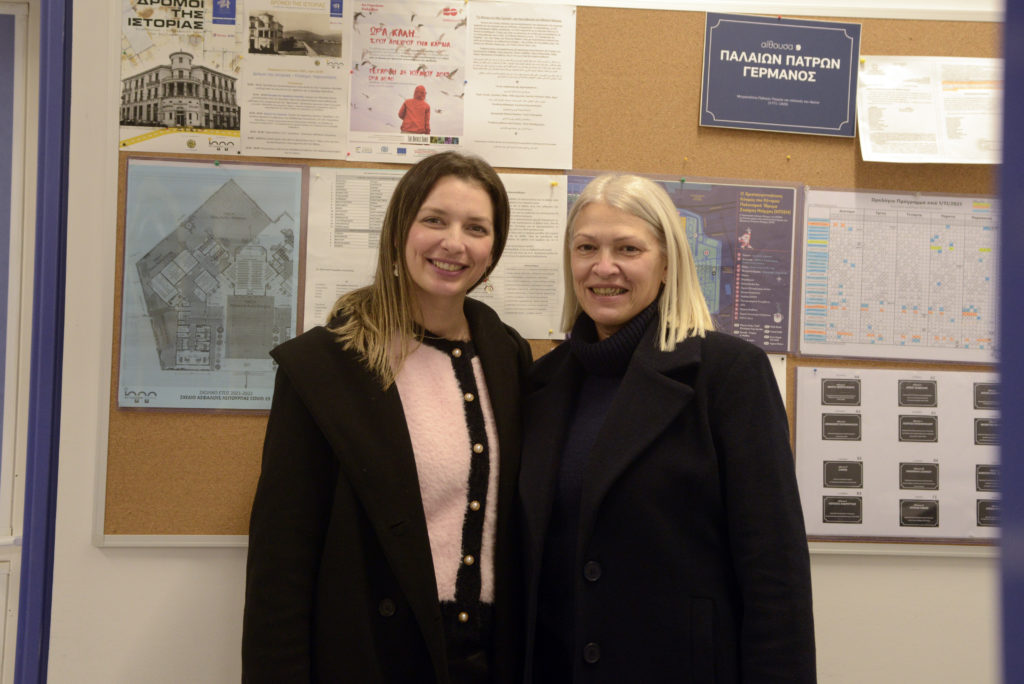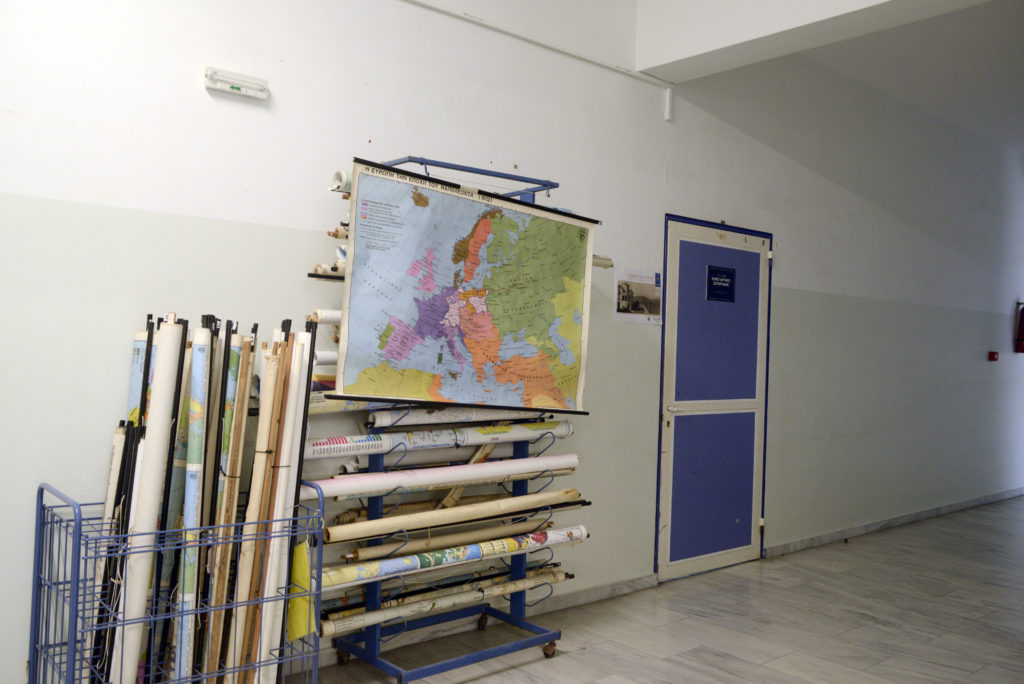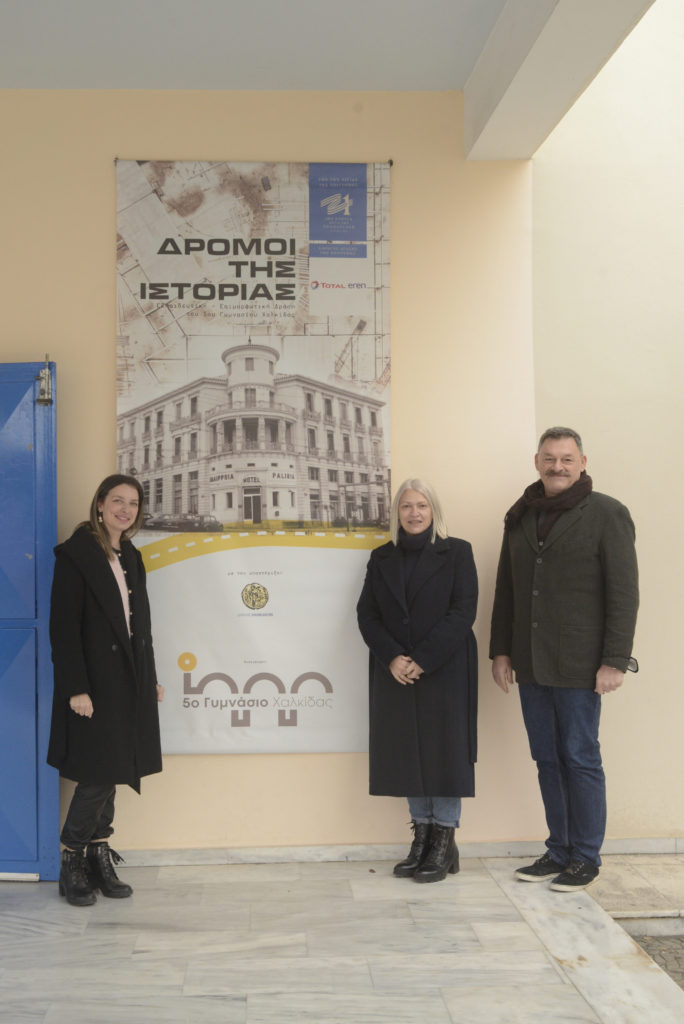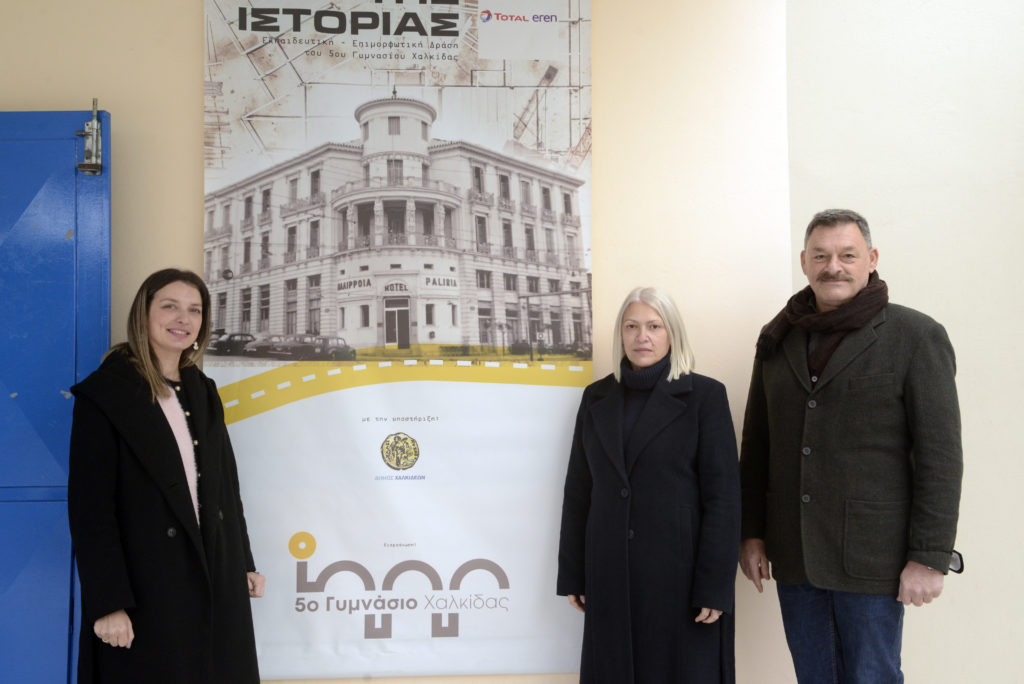Visiting schools of our network is always a valuable opportunity to discuss with educators, directors, and students regarding their current realities, challenges and successes. It is a chance to look into the long-term effects of our project, its sustainability and stay informed regarding the everchanging school environments. The 5th Model Gymnasium of Halkida implemented the Schools For All project during 2019-2021 and since then has been continuously evolving!
The 5th Gymnasium of Halkida, now the 5th Model Gymnasium of Halkida, is located at the main town of the island of Evia, 55 km from Athens. The school stands out for its flexible and dynamic teaching staff and its Director Ioannis Katsanos, who have actively involved the school in various projects, aiming to foster an inclusive and democratic school culture, steering the schools towards positive change.
The school accepted students from urban and semi-urban areas with the heterogeneity that usually exists in a public school. Especially after 2010, intense economic and social problems for a part of the students became visible. It had an early integration class for children with special educational needs, so this school was an option for some parents. There were also first or second-generation immigrant children with different levels of adaptation and finally, since 2017, the school has had a Reception class for children who were hosted in the Ritsona refugee camp, being the first school to welcome these students when other schools of the area refused to do so.
According to its teachers, one of the biggest challenges has been the integration and schooling of refugee students who attended the last four years. The majority of these students did not speak Greek or any other European language and had never attended school in their home country, so they did not know this context. Another important aspect concerned the communication with the pupils’ families, which in some cases was incomplete or non-existent or undermined by tensions due to certain attitudes, prejudices and xenophobia from part of the local community. The school, therefore, had to absorb all kinds of tensions to be able to function harmoniously. The teacher community followed and implemented a series of inclusive actions to prevent the marginalization of the student and the development of racist attitudes.
Implementation of the project and short term benefits
The school implemented the Schools For All project during 2019-2021. The schools’ representatives completed the 3-day Academy and then all the teachers completed the 2-day workshop given by regional trainers Archontoula Manztaridou and Aikaterini Bazigou on 30-31 January 2020, initiating the draft of its action plan. At the time, the students’ community consisted of 330 students of whom 32 were from the Ritsona refugee camp. A second workshop took place in February 2020, also attended by all the teachers.
‘These workshops start as an inclusive activity in themselves within the teacher community’ says Ioannis Katsanos’, explaining that the regional trainers managed to include and motivate even the more neutral teachers. ‘There was a preexisting inclusive context, however, it has a great impact when an external professional visits the school and supports it, as it happened during the collaboration with ‘Schools For All’. It was a recognition of our work and provided a concrete framework’ Ioannis Katsanos mentions.
‘Compared to previous trainings, which were usually subject-specific and conducted by subject area, this training was addressed to all teachers and concerned them equally. Thus there was a discussion and exchange of views and experiences, a common plan of action was agreed upon which everyone was willing to implement, and expectations were created for more actions in the future, states Ioanna Iliopoulou, teacher of the greek literacy.
The educators were especially interested in differentiated teaching methods and became familiar with techniques like, brainstorming, conceptual cartography, easy–to–read method, jigsaw, learning center, think-pair-share, the Frayer model, think-taco-toe, and RAFT (Role Audience Format Topic) aiming at putting into action at least two of these methods into their classrooms. In their action plan, they focused on enhancing their teaching towards inclusion, reinforcing cultural exchange between all students and connecting with students’ families and the local community, and restoring the public image of the school towards the local society.
Unfortunately, not all activities of the action plan were implemented due to the restrictions of COVID-19 and more specifically the exclusion of the students at the refugee camp from online learning.
Nevertheless, significant activities were realized. ‘What was initially implemented was the training of the school teachers in differentiated teaching methods and exploring the relationships of the students with each other and with the school. The former gave teachers tools to address and include all students, while the latter provided information on how students positioned themselves in the classroom and the school.
Although there was resistance from teachers about how to fit extra things into the daily schedule in the classroom, there was a lot of enthusiasm and many discussions when some started to implement the new techniques and many followed them. One such activity was the Blob tree, which when posted completed in the teachers’ room was discussed at length’ explains Ioanna Iliopoulou.
According to Aggeliki Simintzi, math teacher, the most important activity was the collaborative methods followed in the classrooms. ‘Through these activities, the class turned into a group and the students into a company’. Applying the WorldCafé method, she set up groups of 4,5 students within the classroom who worked together and helped each other, involving everyone. Also, she applied differentiated teaching, creating separate material with basic concepts the refugee students had to familiarize themselves with, and thus she collaborated closely with the teacher of the reception class (ZEP). ‘The terminology of math which is in ancient greek was a great impediment, but at the end, there was great progress. No student was left behind, no one was delayed’ Ms. Simintzi exclaims. She also noticed how the children became more friendly with each other and conflicts became fewer.
The students’ points of view add to a more comprehensive understanding of the school.
‘As a students’ council, we tried to ensure that the refugee students could have a normal school life, as we had, which was not the case in the previous years. We wanted them to have the best possible education as well as socialization which is an equally, if not more, important aspect of school’ Giannis, Vice President of the students’ council during 2019-2020, explains. He highlights that in general the problem of interrupted schooling as well as the delay of all the processes of setting up reception classes, the appointment of teachers for these classes and logistic setups, such as their transportation from the camp to school, end up in their coming to school late after student relationships have been formed. ‘Last year, due to the pandemic, the students from the camp first attended school in May!’ he exclaims.
The students’ council during the period of remote education protested against the exclusion of the refugee students, officially via their school Director, and sent Christmas cards with wishes and encouraging messages to the Ritsona Camp. They also wrote two letters, one of protest to the Director of Secondary Education and one to a national telecommunication company for solving the problem of internet access. In the end, the letters were not sent since the lockdown ended and refugee students came to school.
‘We tried to make them feel comfortable and welcome during this short period, hanging out during recess, Evangelia, President of the students’ Council’, says. She points out that her being half African might encourage the students from Kongo to feel more at ease with her and that she could put herself into their place.
The refugee students had a great need, above all, for socialization with people of their own age, for contact with others, and for play, all the students interviewed agreed. ‘ After being in camps with specific people for years, they want to meet youth of other cultures and learn new things, and contribute themselves into their environment and opening up’ Giannis points out. According to his own experience, speaking in French with the two of the refugee students helped their relationship grow and they became friends. Also, their teachers encouraged peer support in the classroom so the students could often translate parts of the lesson into English and Greek. Vice versa, the French-speaking refugee students helped out during the French class.
Long-term Benefits
‘The school’s participation in ‘Schools For All’ contributed positively to the way the school dealt with any challenges that arose. We had a concrete action plan which allowed us to move forward with greater certainty and confidence’ stated Aggeliki Simitzi, math teacher. Today, I feel more confident and experienced to handle potential challenges and to receive again refugee students’ she concludes, adding that she keeps looking for simpler, more practical ways of teaching and still applies differentiated methods of teaching’.
As Ms. Iliopoulou highlights, the benefits of the project remain relevant because there are always different student identities in the classroom, even not always as visibly different as in the case of refugee students. ‘It is a trap to think of a school as a uniform community. There is always a group of students that tend to become invisible, which a teacher must spot, recognize and pay extra attention to’. ‘This year, as a model High School, many of our first-grade students had to leave their friends behind and change school environment. We, as teachers, are now more sensitive to their needs beyond the school performance. We aim at creating an inclusive context, an environment of collaboration. Ms. Simitzi explains.
‘Inclusion is not only other cultures or ethnicities but every different Other who needs to find his/her place in the school’ the school Director, Ioannis Katsanos, sets the tone. For this reason, the school has set up an informal mediation group that facilitates resolving conflicts.
The students also recognize that an inclusive environment is a necessity for all. ΄Τhere are always students that might feel different than the majority, not only refugees, who might have difficulties, feel excluded, are shy. They do not make friends because they are afraid they will not be accepted and stay in the margin’ points out Stelios, member of the students’ Council.
Giannis expresses his belief that the interaction with refugee students has contributed to great progress in the school regarding acceptance and inclusiveness. ‘I had a classmate since Primary School who was always marginalized due to a learning difficulty he has. Throughout school, he only had me and another student as a friend and was laughed at. But now, in the first grade of Lyceum, he lives a normal school life. I think in the past there was more indifference towards bullying and such behaviors but now they are not tolerated’ he shares an example.
The students highlight the fact that they have benefited in various ways from the presence of refugee students. ‘I might wake up one morning and say I do not want to go to school, but these students were coming with joy and enthusiasm. At the place they live, life is hard. Not everything is a given. I can understand better their circumstances and why they left their country to come to another where their future is so uncertain. I can put myself in their shoes’ Giannis realizes. ‘I made friends. With one kid we became close and he affected me in the way that friends do. I am more sensitive and stronger psychologically to act for the future, not only at school’, Despina adds. Evaggelia concludes: ‘I realize I am lucky, I have a home, food, access to education, friends: we have everything. Most of refugee students have been through war, woke up one day, and had to leave their country. All they want is to become part of our society’.
Where the school is now
Visiting the school in December of 2021, despite a day of heavy rain, one enters an inspiring, warm place as if in sunlight. Decorations, posters, activities board, and billboards from the history project ‘History Roads’ the school has realized. The reception class is well kept, but empty.
From the 2021-2022 school year, the school was identified as a Model Gymnasium in the area which means access to more resources for the school and the entering of the students, starting from the current 1st Grade according to math and language competency tests. This also means that this year, the school no longer has reception classes. The school Director Ioannis Katsanos confirms that the participation in the ‘Schools For All’ project and the focus of the school towards inclusion are some of the main reasons they were defined as a Model Gymnasium. The school’s approach remains inclusive, aiming at including as many students as possible and continuing relevant activities, despite not having at the moment reception classes. Additionally, Mr. Katsanos has formally applied for the potential of refugee students to be able to sit in the exams and enter the Gymnasium. ‘We are also still very interested in keeping the school rooted in the neighborhood. So, we collaborate with the local Primary School, and our teachers will assist in preparing the student for entering here. Inclusion is a fundamental pillar of our school function. The other two are digital literacy and energy saving’ he states. We carry on raising awareness within the school and also in the local community. The school director especially mentioned that they have been making interventions in local families of Roma students to encourage their children’s schooling and find solutions to prevent dropouts during the moving of these families to other places.
‘We would like to have refugee students again in our school. I think as a model school it would be even more appropriate to receive them as we should. Students are responsible and less conservative’ says Despina.
The school continues the historic project ‘Roads of History 2021’, where students explored the Greek Revolution of 1821, with the project ‘ Roads of History 2022’, focusing on the refugee issue.
Civic responsibility and participation
As active members of the students’ council, the students shared valuable thoughts regarding their role and participation in school life. They were also really well informed regarding the refugee situation in Greece, current transformations of open refugee camps into closed camps, and they admit that since their coexistence at school they feel more interested and sensitive towards this issue.
They are eager about their role in the students’ council: ‘I joined the students’ council because I feel I can collaborate with fellow students to achieve goals’ states Stelios .
In the current school year, the students’ council has taken initiatives in erasing offensive logos from the school toilets and maintaining them logo-free.
‘This year we would like to put more energy outside school work and focus also on having fun since we have not been able to enjoy a full, in-person school year. Maybe we will organize a celebration or a field trip, if feasible. Also, we will make use of our many school clubs and extra-curricula groups’ adds Despina.
Concluding our discussions, we asked: “What is an inclusive school for you?“
‘A school open to all promotes equal rights to all students regardless of religion, and nationality. It must promote anti-racist ideas and make us understand that we are all different but no one is superior to another, that no one can impose on another. Stelios replies.
“A school should be open to all, regardless of religion, country of origin, etc. because we are all equal and we all have the right to education. By coexisting we understand that we are all the same, by living with each other day by day we understand that we don’t really have anything different. If we see the other from a distance, then we see only the differences’ adds Despina.
‘Inclusion is not charity. Αs the World Economic Forum states, the school of the future should prepare students to be resilient and adaptable. This coexistence contributes greatly to that direction’ Mr. Katsanos concludes.
